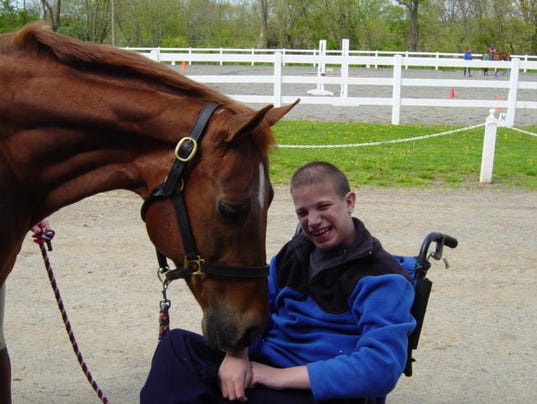“The temperament is crucial. Many, many that we try don’t work out because they don’t have the right temperament,” said Dr. Octavia J. Brown, professor of Equine Studies and director for Therapeutic Riding at Centenary University.

Lucy the therapy horse at Centenary University with Sean.
“That’s why when we have one that really can do this work and be completely 100% reliable, we’re so excited about them. It does take a special kind of horse to do this and this particular horse is very, very good at this. That’s why we named her for this honor. We felt like her story was worth it.”
Lucy, a therapeutic riding horse at Centenary University, has been named Region 2 Horse of the Year by the Professional Association of Therapeutic Horsemanship International or PATH. She was nominated by two of Centenary’s TRAC (Therapeutic Riding at Centenary) clients for her ability to work with students with special needs.
Lucy, whose official name is Strings O Stardust, is a 26-year-old registered American Quarter Horse, who started her life as a western reining competition horse. Centenary purchased her at age 12 when Brown started the therapeutic riding program in 2003.
“The best gift Lucy gives me and all of her riders is self-confidence and happiness to deal with the problems of everyday life,” said one client.
What makes Lucy so special, Brown said, is her ability to adapt to any situation she encounters. The horse is extremely patient and reliable with any age group, from very small children to adults of all ages. She never tires of being petted and will stand forever at the mounting ramp while someone goes through a difficult mounting process. Her smooth, gentle way of trotting allows even the most timid rider the thrill of going faster very safely.
“Our favorite story is a young man who, when he first started riding, did not want to get on the horse. He was on the mounting ramp and Lucy was right beside him, waiting for him to get on and he just didn’t want to do this. This is a child who is non-verbal and all of a sudden, he let out the loudest shout. All of the humans, we kind of jumped,” Brown said.
Therapeutic horseback riding offers a variety of benefits for children and adults with disabilities. As a physical activity, sitting on a horse causes the rider’s upper body to respond to the movement of the horse in a three-dimensional manner. The rhythm of 80 to 100 steps each minute stimulates reflexes and balance reactions in a way that cannot be duplicated by a human therapist.
On the psychological and emotional level, the thrill of being seated on a horse or pony that is trained to respond willingly to the rider’s signals is a powerful benefit. As a form of cognitive therapy, the rider learns to relate to the space of the riding arena, including other riders and special equipment, and interact with the horse to navigate safely.
In 1972, Brown founded Mane Stream on her Bedminster farm as the Somerset Hills Handicapped Riders Club, one of the first centers of its kind in America. When Centenary approached her to teach instructors in her program, she started its program. She’s been at the forefront of therapeutic riding in the United States for almost 50 years.
“We encourage people who might benefit either as clients or also people who would like to volunteer their time because without volunteers, these programs cannot run. People don’t necessarily need horse experience, they just need to be willing to learn and willing to work around the horses. You can get your horse fix.”
To learn more about Centenary University’s TRAC program or to volunteer, call 908-852-1400, ext. 2174.
